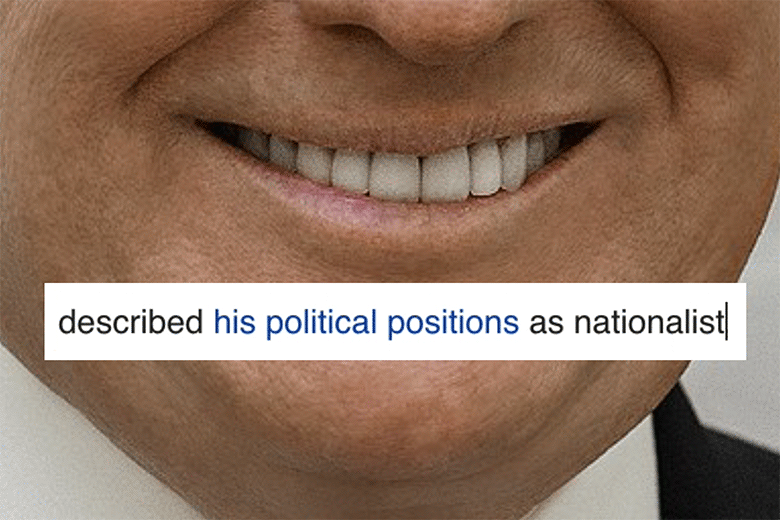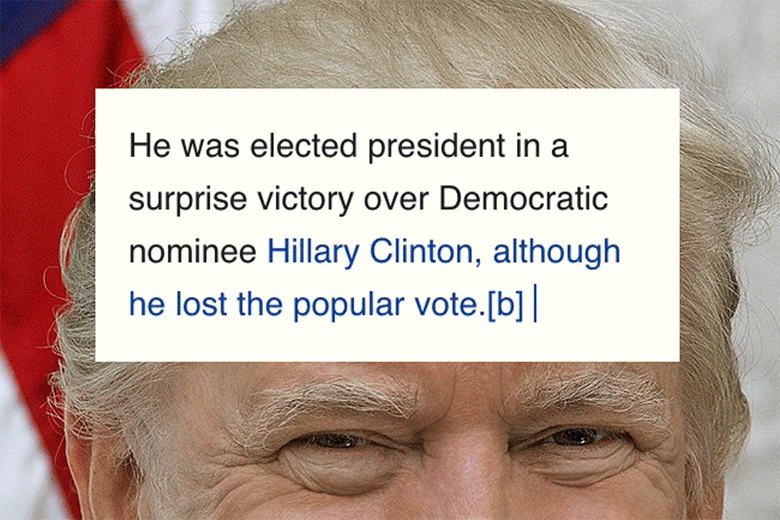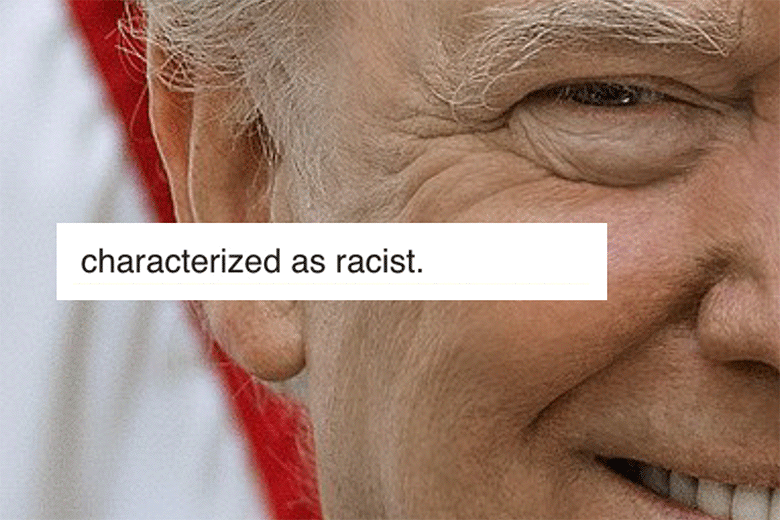On July 16, 2018, Democrats, Republicans, and the media were reeling from the U.S.-Russia summit in Helsinki. President Donald Trump had announced before the entire world that he didn’t “see any reason why” Russia would have interfered in the 2016 election, despite mountains of evidence to the contrary gathered by the intelligence community. Former Speaker of the House Newt Gingrich, generally one of Trump’s biggest cheerleaders, tweeted, “It is the most serious mistake of his presidency and must be corrected—immediately.” Former CIA Director John Brennan called the comments “nothing short of treasonous.” CNN’s Anderson Cooper said on air, “You have been watching perhaps one of the most disgraceful performances by an American president at a summit in front of a Russian leader.”
Wikipedia editors, meanwhile, were split over whether the summit was momentous enough to include on Donald Trump’s page, one of the site’s most contentious areas. On Wikipedia, users can update entries in real time. Some have greater editing powers than others, and some pages have stricter controls, but the site’s self-policed goal remains the same: to accurately convey reliable information in a dispassionate, neutral tone.
This can be tough for a topic like Trump. The debate over the Helsinki summit played out on the Donald Trump entry’s Talk page, a forum where editors frequently congregate to discuss proposed changes, and where any user can submit thoughts on additions, subtractions, or factual inconsistencies. A few hours after the press conference, MrX, one of the page’s most active users, wrote, “The article needs to be updated with Trump’s shocking performance, which sources are describing as treasonous, disgraceful, and ‘played like a fiddle.’ ” Three minutes later, power~enwiki replied, “Let’s not play the ‘promote the most ridiculous comments’ game that the media appears to be playing. Approximately nothing new happened, but there are plenty of ‘former government officials’ willing to give hyperbolic quotes on Twitter.”
And with that, the terms of the debate were set. One group of editors argued that a sitting president siding with Vladimir Putin over U.S. intelligence agencies would have “long-term encyclopedic value,” while another contended that, once this latest episode of mass outrage had subsided, it would barely merit a footnote. “This is an encyclopedia. We are not in competition with newspapers for readership, so there is no rush to print,” user Mandruss wrote.
Editors harangued each other for getting emotional and letting their political biases cloud the debate: “[I]ts just the usual anti Trumpers who attack him no matter what he does,” user AmYisroelChai wrote. “So Paul Ryan, Newt Gingrich, and the Wall Street Journal are anti Trumpers?” MrX responded. One user facetiously suggested that they instead add a line noting that “Trump said he would be good for the Blacks and the record low Black unemployment proves it.”

Soon, bureaucracy intervened to quiet the bickering. Unlike most Wikipedia pages, which mostly anyone can edit, the only way for an entry like Trump’s to function is with a hierarchy. Any user can still argue for a change, but more senior editors—those with at least 30 days of tenure and 500 edits under their belts—have to approve it. And there are even higher levels of power above them: administrators (volunteers who apply for the right to wield special override abilities and are voted in by fellow users after a review of their edit histories) and arbitrators, a group of 13 editors chosen in an annual election who can make final decisions when there’s high-profile misconduct or conflicts arise involving administrators. On Trump’s page, there’s also an unofficial editorial board of experienced users who try to protect the page’s integrity.
The senior editors put the Helsinki proposal to a vote, which clarified little. The results were roughly tied, but even final tallies don’t necessarily dictate outcomes. Instead, administrators with special editing privileges weigh the quality of the arguments made on both sides against Wikipedia’s editorial policies on things like neutrality and reliable sourcing, and make a decision.
After 10 days of trying to reach a consensus on the Helsinki debate, administrator Awilley concluded there was enough support for the inclusion and closed the discussion. The article now notes, “Trump drew harsh bipartisan criticism in the United States for appearing to side with Putin’s denial of Russian interference. … His comments were strongly criticized by many congressional Republicans and most media commentators, even those who normally support him.” By the time the decision came down, however, most of the editors had moved on to discussing other topics: the upcoming North Korea summit, Trump’s role popularizing Obama “birther” conspiracy theories, and his popularity among white supremacists, to name a few.
Wikipedia’s name is a portmanteau of wiki, the Hawaiian word for “quick,” and encyclopedia. Nowhere do these two concepts feel more inherently at odds than on Donald Trump’s page. The entry has been viewed more times than any other article about an individual person since December 2007, when Wikipedia started keeping more detailed records of readership data. By January of this year, it had been visited 156 million times, 30 million times more than the second-place article, about Barack Obama. (The most viewed article overall was about the United States.) Trump’s Wikipedia page is essentially a biography; only around 30 percent of the article discusses his presidency. It also acts as a hub where visitors can find links to a whole network of articles on subtopics like “Presidency of Donald Trump,” “Racial Views of Donald Trump,” and “Donald Trump on Social Media.”
The main Trump page is constantly in motion. It’s undergone more than 28,000 edits since its creation in 2004, some as simple as typo fixes. Debates on the Talk page—which Wikimedia Foundation executive director Katherine Maher has characterized as “almost like the newsroom behind any Wikipedia article”—are all archived. One of the earliest discussions from Trump’s page had to do with confusion over whether he had actually purchased WWE’s Monday Night Raw franchise in 2009. It turns out the business deal was just a fictional plot point for the show.
Since Trump moved into the White House, the editing process has become a lot more complicated. Last November, vandals hacked into the accounts of senior page editors and swapped out the Trump article’s main image for a new one: specifically, a photo of a penis. Then, because Siri often cites Wikipedia in her answers, anyone who asked their iPhones about Trump’s age saw a vivid close-up of male genitalia materialize on their screens. Editors on the Talk page say they were particularly worried that press coverage of the incident would inspire copycats.
The incident prompted an administrator named MelanieN to temporarily place the page under “full protection,” which means that only administrators can make edits. It’s the strictest level of control on Wikipedia and is used sparingly. Other pages that have been locked down in “full protection” mode include entries for the Quran and the Virginia Tech shooting.

Most of the time, the Trump page is subject to “extended confirmed protection,” a strict setting that prevents random users from making direct edits to the live page. When I submitted copy edits to fix misspellings and punctuation errors, higher-ranking users had to approve them, because even simple edits can raise issues. Senior editors are often on the lookout for suspicious activity—say, someone in the Trump administration who might be trying to influence the article to portray the president in a better light. This wouldn’t be unprecedented. An intern for former Massachusetts Rep. Marty Meehan deleted information about Meehan’s pledge not to run for reelection in 2006. Texas Rep. Louie Gohmert admitted during a December hearing that his staff had been altering his page every night over a span of two weeks. There was even a Twitter account that tracked edits coming from congressional IP addresses, but it was suspended in October, when people started using it to dox Republican senators.
The Wikipedia community’s preoccupation with privacy can sometimes make it hard to suss out exactly who is making edits and whether those people may have ulterior motives. Wikipedia users rarely list their names or any other identifying information on their profiles, unlike most Facebook or Twitter accounts. This is true even among the administrators. (Members of the Arbitration Committee tend to be more forthcoming about their identities.) The most important editors on the Trump page—the unofficial editorial board—have been able to exert their influence not because they have special expertise (though some may), but because they have long been the most frequent contributors to this particular Talk page. They act as the entry’s ever-present custodians, debating all potential changes—even those as seemingly minor as a proposal to add Trump’s height. (It was rejected.) And all the while, readers know little or nothing about who exactly is presiding over one of the internet’s most high-profile sources about the most powerful person in the world.
Wikipedia editors do, however, tend to leave hints about who they are—and some are more open about their identities than others. The Trump page’s most active editors include Scjessey (real name: Simon Jessey), a former website designer and college instructor living in Pennsylvania who also likes to edit articles on motor sports and says he’s “socially progressive, but fiscally somewhat conservative.” There’s JFG, who has been a Wikipedia editor for more than 10 years and lives in Switzerland. “I’m Swiss; we are known for neutrality, independence and precision—some valued Wikipedian qualities!” he said via email. There’s MrX, a more progressive editor who started the Helsinki summit discussion. He became active in the Wikipedia community in 2011 and enjoys editing pages about architecture and geography, as well as politics. Atsme, a user who often defends Trump, was once a documentary filmmaker and also edits pages about marine life. MelanieN, the administrator who locked the page down, mostly edits pages related to San Diego but also dips into the Trump Talk page to maintain order. Snow Rise, another administrator, is active in trying to contain spiraling debates.
A disproportionate number of editorial skirmishes on the Trump page have to do with the article’s four-paragraph introduction section. Wikipedia editors place special emphasis on introductions because visitors typically only spend a few minutes on a given page, and so the first four paragraphs might be the only part they read.
On Trump’s page, some editors have lobbied fervently for an additional line mentioning the Mueller report or Trump’s efforts to cast doubt on the fact that Obama was born in America. Neither of these proposals have been enacted. But perhaps the most controversial section of the Trump intro is the third paragraph:
Trump entered the 2016 presidential race as a Republican and defeated sixteen opponents in the primaries. Commentators described his political positions as populist, protectionist, and nationalist. He was elected president in a surprise victory over Democratic nominee Hillary Clinton, although he lost the popular vote. He became the oldest and wealthiest person ever to assume the presidency, and the first without prior military or government service. His election and policies have sparked numerous protests. Trump has made many false or misleading statements during his campaign and presidency. The statements have been documented by fact-checkers, and the media have widely described the phenomenon as unprecedented in American politics. Many of his comments and actions have been characterized as racially charged or racist.
The line about Trump’s racism has received particular scrutiny. To some editors, the qualifiers “characterized as” and “racially charged” seem weaselly. “ ‘Racially charged’ is nebulous and unclear,” user HiLo48 wrote on the Talk page. “It’s almost the type of euphemism Trump would use himself.”

Yet the very existence of this sentence in the introduction is something of a miracle given Wikipedia’s strict conception of neutrality and the fact that a sizable faction of editors ardently believes that Trump is not racist. “Take a look at the page, ‘Racial Views of Donald Trump’ … and tell me if there’s one view expressed by Donald Trump about race,” said JFG. “I don’t see one; to me, this page is pure fantasy.”
Similar debates have cropped up around the paragraph’s description of Trump’s mendacity and the protests during his administration. Some editors maintain that the lies and the protests are defining characteristics of the man and his presidency; others contend that every president faces protests and that every president lies.
The unprecedented number of attacks on the news media in the era of Trump makes it at times impossible for editors to agree on a basic set of facts. Wikipedia guidelines advise that editors refer to “reliable sources” like the New York Times and the Washington Post—the very same outlets that the president likes to say are purveyors of “fake news.” And some editors contend that leaning on these journalistic institutions would threaten the neutrality at the core of Wikipedia. “The press is against Trump,” said JFG, “so you have to give some balance to that.”
The challenge of maintaining Donald Trump’s Wikipedia page isn’t just a byproduct of his polarizing image. After all, Wikipedia must also manage pages for abortion, climate change, and the Israel-Palestine conflict. And there are plenty of mechanisms in place for addressing contested information, such as limitations on the number of times a user can undo someone else’s changes and sanctions for disruptive behavior like secretly operating multiple accounts. Wikipedia also deploys bots, powered by artificial intelligence, that can quickly revert obvious vandalism based on indicators like vulgar language.
What really sets Trump’s page apart from others is the volume of news his administration produces. Wikipedia editors often struggle to pick out developments worthy of inclusion from this nearly constant barrage of activity and to accurately portray situations that may still be in flux.
The speed and ease with which users can make edits can result in what the Wikipedia guidelines call “recentism.” It refers to the common trap of overloading an entry with the latest news, rather than preserving a balance that allows readers to understand the subject through a historical lens. Readers aren’t likely visiting the page to learn the very latest about the impeachment controversy. Yet when news began trickling out last June that the administration was implementing the “zero tolerance” policy of separating children from their parents at the border, there was a sense of urgency among some editors to include that development in the article. “I think we need a brief paragraph,” MrX wrote. “The great southern border wall has disappeared from the zeitgeist, replaced by images of children separated from their parents—some lost in the system, some in cages, others wrapped in foil like baked potatoes.”
Not everyone was on board. Some users argued that it should only appear in the far less prominent article for the “Presidency of Donald Trump.” Others parroted the administration’s talking point that the practice was a holdover from previous administrations and argued that the whole controversy was an overrated hullabaloo cooked up by vindictive journalists. “Laws are laws—enforcement of those laws has obviously become politicized and sensationalized by clickbait media, most of which are proven to be 90% negative toward Trump,” Atsme wrote.
Editors began lobbing personal attacks at each other, which have since been redacted from the Talk page record. One user accused another of writing an anti-Semitic comment elsewhere and implied that this user therefore didn’t have the grounds to call out Trump for discrimination. The next week, administrator MelanieN wrote a lengthy post reprimanding others for letting things get “way out of control” and calling out MrX for making additions without the group’s consensus.
MrX was not pleased. “Well, MelanieN, thank you once again for portraying me as the bad guy who started the fracas, while omitting that I started the discussion and that the discussion was leaning toward inclusion before I made a WP:BOLD edit in accord with Wikipedia’s foundational principles.” The Wikipedia guideline to “be bold,” or “WP:BOLD,” encourages users to make fixes rather than just talking about them. Another editor, Mandruss, later wrote: “We need to wait until there is consensus, not until (we perceive that) a discussion is ‘leaning’ [toward inclusion]. If you get to do it, everybody else gets to do it, too, and you will often strongly disagree with their perception and judgment.”
MrX offered a snarky reply—“It sounds like you have an issue with bold editing or perhaps the world is moving too fast for you”—but also drafted a three-line summary of the administration’s family separation policy and posted it on the Talk page. Users debated the wording. Conservative-leaning editors grumbled. And the proposal eventually won inclusion.
The dynamic on Trump’s page may be a relentless, exhausting tug of war. But in this context, disagreement—even heated, churlish, insult-hurling disagreement—is often not ultimately a bad thing. This might be the most surprising thing about the Wikipedia page for Donald Trump: The angriest squabbling usually ends in some form of grudging consensus. “When, on the same article, you’ve got a group of editors who say, ‘This is absolutely biased one way,’ and you have another bunch of editors who say, ‘This is absolutely biased the other way,’ ” JFG told me, “that’s when you’re correct.”